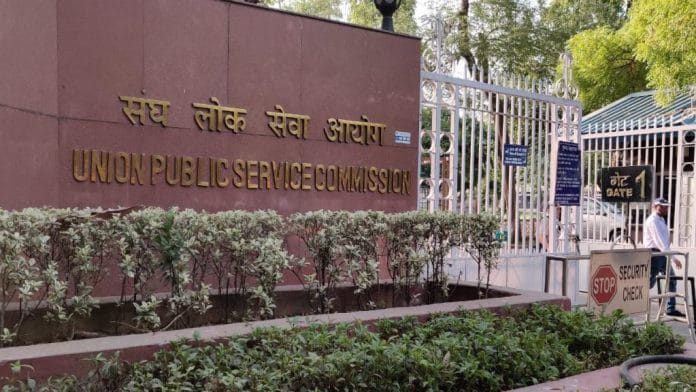
Thank you dear subscribers, we are overwhelmed with your response.
Your Turn is a unique section from ThePrint featuring points of view from its subscribers. If you are a subscriber, have a point of view, please send it to us. If not, do subscribe here: https://theprint.in/subscribe/
The civil services examination has been seen as the zenith of career progression by several generations in India. In spite of its daunting reputation and immense syllabus, millions line up to attempt the test each year.
In both 2020 and 2021, despite the alarming spread of the virus, well over 10 lakh people registered to take the CSE Prelims exam. So how does UPSC go about sifting through the masses to find the crème de la crème of India? And how fair is their process for the vast swathes of India’s youth, who spend the best years of their lives preparing for this examination? This article delves into both these questions.
UPSC conducts the Civil Services examination in 3 stages with the selection ratio improving in each progressive stage. One needs around 99 percentile to clear Prelims, 75-80 percentile to clear Mains, and around 50 percentile to clear the Interview stage.
The prelims stage, which is the biggest filter, contains a motley of questions from all parts of the syllabus and has a nasty reputation for not rewarding the efforts of aspirants with commensurate marks. Rather, it is common knowledge among aspirants that regardless of the quantum of preparation they put in, it is unlikely that they will know the answer to over 40-45 questions (out of 100). Getting selected in Prelims now has become increasingly contingent upon guessing correct answers using the options provided for that problem.
We’ve reached this state of affairs because imperceptible questions now routinely make their way into the examination. There is increasing recourse to abstract problems which are extraneous to the syllabus, as well as hyper-specific questions that demand specialist knowledge. Candidates are unable to discern how they are supposed to approach this examination as there is no clarity in the syllabus or pattern within the previous years papers. All this has come about due to UPSC’s desire to accomplish certain peculiar goals.
The principal goal for UPSC while framing its examination is ensuring that all aspirants enjoy a level-playing field. However, many aspects have to be addressed to achieve this stated aim.
Also read: COVID impacted UPSC aspirants demand compensatory attempt
The first among these is ensuring that veteran candidates don’t fare any better than novice aspirants. To accomplish this, UPSC has dispensed with the concept of “standard books”, and as a result, questions from subjects like History, Polity, Economy etc. can no longer be prepared from just one set of authoritative texts – as they could be in the recent past.
Papers for the past several years have also not adhered to any consistent pattern, with the weightage accorded to different subjects fluctuating wildly. While the intention that led to these changes is a noble one, these steps have enormously increased the barrier to entry for aspirants who suffer from a dearth of resources and guidance. Clearing the examination with self-study has now become much harder.
The second part of the goal of a “level-playing field” is ensuring that people, regardless of their educational background, find the exam equally easy or difficult. This is particularly hard to accomplish as the syllabus of UPSC CSE has an immense overlap with humanities subjects. Aspirants, formerly, were able to ace the exam by being au fait with the core subjects like History, Geography, Polity etc. Now, however, UPSC has diversified into a much wider gamut of themes, encompassing areas of Astronomy, Biology, Environment etc. demanding far more versatility from candidates. Like the point above, this has created more problems than solutions for candidates who are worse off financially and educationally. It has also increased the demand for coaching which is antithetical to UPSC’s aim.
It is important at this stage to evaluate how digitization of the preparation has shaken things up. It has broken silos, allowed free dissemination of knowledge, allowed candidates to share their knowledge, and made several quality-of-life improvements for those living in the coaching hubs – like finding a roommate.
For many, however, this is counterbalanced by several adverse changes. The digitally illiterate candidates, as well as those who lack access to the web, now lag even further behind. The market has become inundated with unscrupulous actors in the name of coaching. And a very discernible increase in difficulty of the exam has paralleled the rise in digitization.
These factors, and some others, have combined to make CSE Prelims the convoluted mess that it has become today. Repeated calls from civil society to overhaul it definitely possess merit. To any objective observer, it is clear that the whole ordeal of CSE Prelims has nothing to do with assessing the governance potential of a candidate, but rather of merely memorizing disjointed facts. If we are to find the most capable leaders for tomorrow, and do justice to India’s striving youth, this pattern of examination must surely be forfeit for some better alternative.
Also read: Qualify UPSC IAS Prelims 2021: Get assured success in Civil Services Exam
These pieces are being published as they have been received – they have not been edited/fact-checked by ThePrint.


COMMENTS